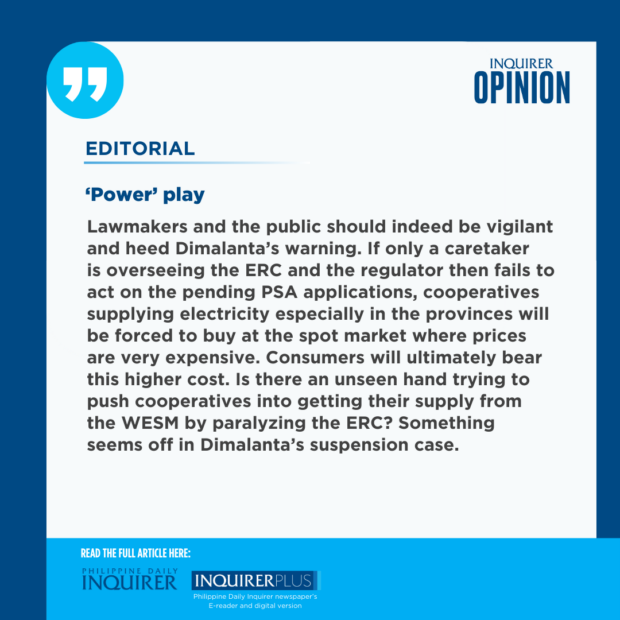
President Marcos has named Justice Undersecretary Jesse Hermogenes Andres as officer in charge (OIC) of the Energy Regulatory Commission (ERC) following the six-month preventive suspension of Monalisa Dimalanta as chair of the regulator.
The designation of Andres may have complied with the order of the Ombudsman for the Executive Secretary to appoint an OIC, but still fails to resolve the critical issue raised by Dimalanta.
An OIC is a temporary arrangement to avert paralyzation of the ERC’s operations. In effect, the OIC technically has limited powers that are confined to functions of administration and ensuring that the office continues its normal activities. In short, Andres will be the caretaker while the ERC head is absent. Dimalanta has appealed her suspension and is still the head of ERC. She filed a motion for reconsideration on Sept. 11.
In an Aug. 20 decision signed by Ombudsman Samuel Martires on Aug. 27 and made public early this month, the Ombudsman said the case stemmed from a complaint of the National Association of Electricity Consumers for Reforms Inc. that the ERC delays in the recomputation of the rates of Manila Electric Co. (Meralco) went against public interest.
Projected spending
Meralco had sought the ERC’s approval of its annual revenue requirement and spending program for the fifth regulatory period (5RP) covering July 2022 to June 2026. During this period, a regulated entity such as Meralco needs to submit its projected spending, while the ERC will evaluate how much of it should be passed on to consumers.
In her appeal, Dimalanta clarified that the ERC already decided on Meralco’s case on Aug. 21. She explained that in a 3-2 vote of its commissioners, the ERC ruled that Meralco’s current P1.35-per-kilowatt-hour (kWh) distribution charge will be in effect until 2026, or the end of the 5RP.
According to Dimalanta, three commissioners voted to consider the 5RP lapsed, thus allowing Meralco to simply adopt its existing rate. But in dissenting, she argued that the period had not technically ended and that a lower distribution charge could have been possible if the ERC had reviewed Meralco’s application.
This power situation in the ERC is worrisome as it can be detrimental to electricity consumers. While Dimalanta’s suspension is pending and the ERC run by a caretaker, consumers, particularly in the Visayas, may have to pay higher electricity bills starting next month.
Volatile and expensive
Dimalanta noted that more than 20 electric cooperatives have pending power supply agreement (PSA) applications at the ERC. PSAs are signed between electricity distributors and generators so that the former can avoid having to buy from the Wholesale Electricity Spot Market (WESM), where prices are volatile and expensive since these depend largely on supply and demand. These costs are passed on by distributors to consumers as the generation charge, or the cost of power they bought from generators that accounts for more than half of a consumer’s monthly electricity bill.
Data from the Independent Electricity Market Operator of the Philippines showed that as of last week, prices at WESM averaged P3.19 per kWh. In contrast, PSAs entered into by distributors and generators often have fixed prices that need to be lower than the WESM average. Meralco’s PSA, for example, is priced less than half of WESM rates.
Thus, without an appointed head of the ERC, the regulator will not be able to act on the pending PSAs. Without such agreements, cooperatives will be forced to buy expensive electricity from WESM and pass the cost on to consumers.
Unseen hand
The suspension had raised a few eyebrows, with some observers also noting that it was rather harsh.
DMCI Holdings chair Isidro Consunji, whose family’s interests extend to power generation, wondered why the case filed by the consumer group advanced quickly.
Dimalanta said she was not taken aback by the complaint as it was something public servants face. However, while she received a copy of the suspension order a few days after it was released to the media, she still was not given a copy of the complaint itself.
She was thus left wondering what evidence the complainant had submitted to merit the issuance of the preventive suspension order.
Dimalanta hinted that “there is more to it” than a simple case of suspension and urged consumers and stakeholders in the sector to “remain vigilant and put a close watch on the decisions, actions of the commission.”
Lawmakers and the public should indeed be vigilant and heed Dimalanta’s warning. If only a caretaker is overseeing the ERC and the regulator then fails to act on the pending PSA applications, cooperatives supplying electricity especially in the provinces will be forced to buy at the spot market where prices are very expensive. Consumers will ultimately bear this higher cost. Is there an unseen hand trying to push cooperatives into getting their supply from the WESM by paralyzing the ERC? Something seems off in Dimalanta’s suspension case.